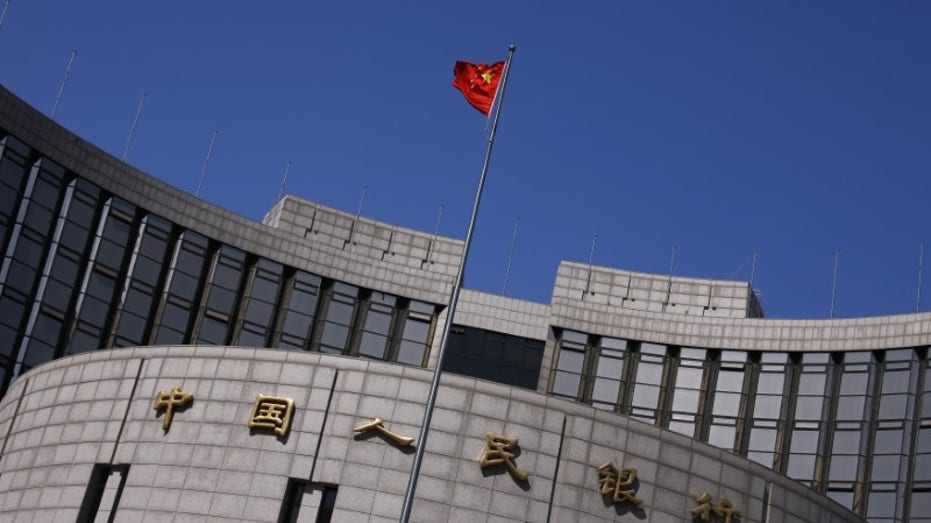China growth slows across all fronts in July, prompting unexpected rate cut
Russia war in Ukraine, efforts by central banks in US and Europe to tame inflation weigh on China
Biden taking a 'big risk' with China: There is reason for worry
The Hudson Institute Director of Chinese Strategy Michael Pillsbury reacts to the president saying he is 'not worried' about China's increased aggression towards Taiwan on 'Varney & Co.'
China's economy stumbled in July as a two-month boost from easing lockdowns faded, prompting the country's central bank to unexpectedly cut two key interest rates in an effort to shore up faltering growth.
A raft of data released Monday showed economic activity slowed across the board in July, including factory output, investment, consumer spending, youth hiring and real estate, highlighting the breadth of the economic challenge facing policy makers in a politically sensitive year for leader Xi Jinping, who is expected to break with recent precedent and seek a third term in power this fall.
The fresh evidence of China's slowdown adds to the headwinds facing the global economy this year, which is already reeling from the fallout from Russia's invasion of Ukraine and efforts by central banks in the U.S., Europe and beyond to tame rocketing inflation by jacking up borrowing costs.
The world's second-largest economy is straining under the effects of Beijing's zero-tolerance approach to Covid-19 and a deflating property bubble, which have triggered protests and mortgage-payment strikes in several provinces and cities. Consumers are reluctant to spend and businesses are wary of investing, a consequence of the "humongous uncertainty about the future," said Alicia García-Herrero, Asia-Pacific chief economist at investment bank Natixis in Hong Kong.
MAZDA MOVES AWAY FROM CHINESE SUPPLIERS, ATTEMPTS TO BOLSTER DOMESTIC PRODUCTION
One stark sign of China's economic malaise: One in five Chinese youth, or 19.9%, was unemployed in July, Monday's figures showed, the highest level since China started publishing such data in 2018.
On Monday, the People's Bank of China cut by 0.1 percentage point two key interest rates and pumped the equivalent of $59.3 billion into the financial system to rev up lending and wider economic growth. The unexpected move marked a small step toward more support for China's economy, and may foreshadow further cuts to borrowing costs in the months ahead, some economists said.

A Chinese national flag flutters outside the headquarters of the People's Bank of China, the Chinese central bank, in Beijing, April 3, 2014. (REUTERS/Petar Kujundzic / Reuters Photos)
But overall, officials have signaled they are unpersuaded by the need for more forceful policy action, mindful of risks such as rising inflation and ballooning debt. Senior Chinese leaders have effectively dropped a growth target of around 5.5% for the year, and the question now for many economists is just how feeble growth is likely to get.
Data released by China's National Bureau of Statistics Monday showed industrial production rose 3.8% from a year earlier in July, easing from a 3.9% year-over-year increase in June and well short of the 4.5% growth expected by economists polled by The Wall Street Journal.
CHINA VOICES OPPOSITION TO NEW $52 BILLION US CHIPS AND SCIENCE ACT
Factory output and exports have been a bright spot for Chinese growth for the past two years, especially after production resumed and supply-chain kinks were worked out following the lifting of lockdowns imposed in the spring to contain Covid-19. But economists have long expected demand for Chinese goods to begin to fade as consumers in the West feel the pinch from rising prices and interest rates.
Retail sales, a key gauge of consumer spending, grew 2.7% from a year earlier in July, a weaker reading than the 3.1% recorded in June and the 5.0% increase expected by surveyed economists.
Consumer confidence has been rocked by the threat of repeated lockdowns and China's property bust. Separate data released Monday showed new home prices posted their steepest year-over-year decline in more than six years in July, highlighting the strain in the real-estate market after a yearlong regulatory squeeze that has hit sales and led to stalled projects and developer defaults.

Chinese President Xi Jinping is zeroing in on the ties that China’s state banks and other financial stalwarts have developed with big private-sector players, expanding his push to curb capitalist forces in the economy. (AP Photo/Mark Schiefelbein / AP Newsroom)
Average new-home prices in 70 major cities fell 1.67% in July from a year earlier, compared with June's 1.29% decrease, according to Wall Street Journal calculations based on data released Monday by China's statistics bureau.
On a month-on-month basis, average new-home prices fell for an 11th consecutive month. Prices dropped 0.11% in July from June, widening from the previous month's 0.10% decline, the statistics bureau said. Only 30 of the 70 cities recorded a month-over-month increase in home prices in July, down from 31 cities in June.
Officials have pinned their hopes for an economic revival this year on lavish government spending on infrastructure, but data so far suggest the benefits of that push have been limited, likely reflecting financing strains on the provincial governments tasked with implementing the policy, economists say. Fixed-asset investment slowed in July, rising 5.7% on year in the January-July period, compared with the 6.1% pace recorded in the first half of the year. Economists had expected growth of 6.2%.
The unemployment rate for those age 16 to 24 rose to 19.9% in July, from 19.3% in June, setting a record. The overall jobless rate edged down, however, to 5.4% from 5.5%.
GET FOX BUSINESS ON THE GO BY CLICKING HERE
Senior Chinese Communist Party officials announced no new fiscal stimulus measures at a meeting late last month and pledged to stick with their zero-tolerance approach to managing Covid outbreaks, while appearing to drop their official goal of increasing gross domestic product by around 5.5% this year. Many economists expect China to record growth of around 3% to 4% in 2022.
Grace Zhu and Bingyan Wang in Beijing contributed to this article.




















